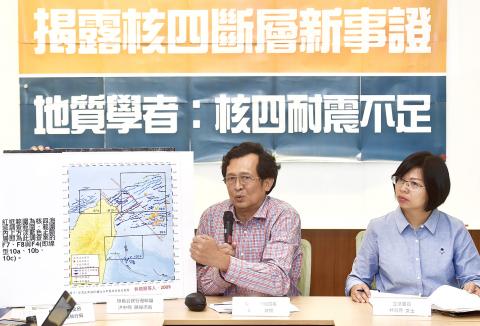The nation’s Fourth Nuclear Power Plant should not be activated, because a geological survey has confirmed that it sits close to active fault lines, activists said yesterday.
The survey shows that there are five active faults near the mothballed power plant in New Taipei City’s Gongliao District (貢寮), which has never been put into operation, National Taiwan University Department of Geosciences professor Chen Wen-shan (陳文山) said at a news conference.
For safety reasons, the plant should not be activated as recommended by Kaohsiung Mayor and Chinese Nationalist Party (KMT) presidential candidate Han Kuo-yu (韓國瑜), as well as some advocates of nuclear energy, Chen added.

Photo: Chien Jung-fong, Taipei Times
If the government ultimately decides to proceed with the project, the plant would be incapable of withstanding a strong earthquake because it is not designed to do so, he said.
However, the survey that was carried out by the Ministry of Economic Affairs’ Central Geological Survey (CGS) has not been made public, he said.
In 2011, soon after a powerful earthquake and tsunami triggered the Fukushima Dai-ichi nuclear power plant disaster in Japan, the government instructed state-run Taiwan Power Co (Taipower) to task the CGS with conducting a survey of the Fourth Nuclear Power Plant area, Chen said.
For three years, Taipower put off having the survey done and, in 2014, the then-KMT administration halted construction of the plant amid safety concerns, he said.
Earlier this year, Taipower finally asked the CGS to conduct the survey and in two internal meetings, the unit confirmed the presence of the fault lines near the power plant, Chen added.
Taipower and the CGS should immediately release the findings of the survey, Democratic Progressive Party Legislator Lin Shu-fen (林淑芬) said at the news conference.
Green Action Alliance deputy secretary-general Hung Shen-han (洪申翰) told reporters that the survey proved that it is too dangerous to start up the plant.
The news conference was held to push back against Han’s plan to operate the Fourth Nuclear Power Plant if elected president, assuming it is safe to do so and he has the public’s consent.
Meanwhile, Atomic Energy Council Minister Hsieh Shou-shing (謝曉星) yesterday told lawmakers that there is “zero possibility” of the plant being activated, as it does not meet safety standards.

Alain Robert, known as the "French Spider-Man," praised Alex Honnold as exceptionally well-prepared after the US climber completed a free solo ascent of Taipei 101 yesterday. Robert said Honnold's ascent of the 508m-tall skyscraper in just more than one-and-a-half hours without using safety ropes or equipment was a remarkable achievement. "This is my life," he said in an interview conducted in French, adding that he liked the feeling of being "on the edge of danger." The 63-year-old Frenchman climbed Taipei 101 using ropes in December 2004, taking about four hours to reach the top. On a one-to-10 scale of difficulty, Robert said Taipei 101

Nipah virus infection is to be officially listed as a category 5 notifiable infectious disease in Taiwan in March, while clinical treatment guidelines are being formulated, the Centers for Disease Control (CDC) said yesterday. With Nipah infections being reported in other countries and considering its relatively high fatality rate, the centers on Jan. 16 announced that it would be listed as a notifiable infectious disease to bolster the nation’s systematic early warning system and increase public awareness, the CDC said. Bangladesh reported four fatal cases last year in separate districts, with three linked to raw date palm sap consumption, CDC Epidemic Intelligence

Two Taiwanese prosecutors were questioned by Chinese security personnel at their hotel during a trip to China’s Henan Province this month, the Mainland Affairs Council (MAC) said yesterday. The officers had personal information on the prosecutors, including “when they were assigned to their posts, their work locations and job titles,” MAC Deputy Minister and spokesman Liang Wen-chieh (梁文傑) said. On top of asking about their agencies and positions, the officers also questioned the prosecutors about the Cross-Strait Joint Crime-Fighting and Judicial Mutual Assistance Agreement, a pact that serves as the framework for Taiwan-China cooperation on combating crime and providing judicial assistance, Liang

US climber Alex Honnold left Taiwan this morning a day after completing a free-solo ascent of Taipei 101, a feat that drew cheers from onlookers and gained widespread international attention. Honnold yesterday scaled the 101-story skyscraper without a rope or safety harness. The climb — the highest urban free-solo ascent ever attempted — took just more than 90 minutes and was streamed live on Netflix. It was covered by major international news outlets including CNN, the New York Times, the Guardian and the Wall Street Journal. As Honnold prepared to leave Taiwan today, he attracted a crowd when he and his wife, Sanni,